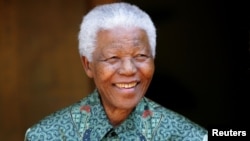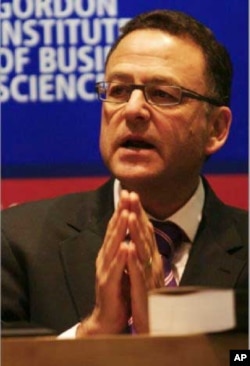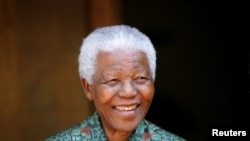JOHANNESBURG, SOUTH AFRICA —
“(Mandela) was this semi-mythical figure whose picture and image was banned in South Africa…. We (students) just knew that this man at that stage had been in prison for 17 years or so and that in many ways the freeing of Mandela was the key to unlocking a relatively peaceful future for a democratic South Africa. And all that turned out to be bang on the money,” says Leon, a veteran liberal politician.
But, from being a “foot-soldier” for the ‘Free Mandela’ campaign, Leon would end up being one of the liberation icon’s greatest political foes. When Mandela served as South Africa’s first democratically elected president, from 1994 to 1999, Leon led the Democratic Party (DP), which vehemently opposed the Nobel Peace Prize winner’s party, the ANC, in parliament.
Yet down the years, the two have remained firm friends, with Mandela often lauding Leon’s contribution to democracy.
‘Highly symbolic’ moment
As a young white opponent of racism in South Africa, Leon turned to Mandela’s words for inspiration. “The famous speech from the dock that Mandela had made in 1964 at the Rivonia trial – that the idea and the ideal of a non-racial, democratic South Africa was something he’d striven for and fought for and lived for, but if necessary he was prepared to die for – I thought that was one of the most remarkable texts,” he says.
In the 1980s, Leon rose through the party ranks to eventually be a member of parliament for the DP. On February 2nd, 1990, he watched “in amazement” from the back benches as South Africa’s last white president, FW De Klerk, shocked the world by announcing that Mandela would be released within a matter of days.
Nine days later, Leon saw him “in the flesh” for the first time. He was part of a crowd of hundreds of thousands of people who thronged Cape Town’s Grand Parade to hear Mandela give his first speech after being released.
“The crowds were pushing backwards and forwards and it was all extraordinarily disorganized and chaotic really,” he explains.
Leon took part in the negotiations that resulted in the end of apartheid. He reflects, “The first glimpse I had of Mandela face to face was when he made that attack on De Klerk at the opening of (those talks in December 1990).”
Then-President De Klerk had opened the negotiations by accusing the ANC leader of a “lack of commitment” to the democratic process because, he said, Mandela had reneged on a pledge to suspend the ANC’s armed struggle against his government.
That, says Leon, led to a “highly symbolic” moment in South African history.
“Mandela … stood up at the podium and lost his temper with De Klerk. It was extremely improbable, the way it happened in front of my eyes – that a black leader would tell off the white sitting president – which is exactly what Mandela did on that occasion.” He accused De Klerk of leading an “illegitimate minority regime” and of “lacking morality.”
Leon takes Mandela cake … and is rewarded with dinner
A few months later, Leon heard that Mandela had moved into a house in the plush Johannesburg suburb of Houghton. “So I thought, ‘Well, I’ll take him a cake’ – I was the MP (member of parliament for Houghton). And I left him a note saying, ‘Welcome to the neighborhood’ and so on,” he says.
Two days later, Leon received a message on his telephone answering machine. He remembers, “There was this world-famous voice – and I (at first) presumed it was someone playing a trick on me – but it was Nelson Mandela. He said, ‘Thank you so much for the cake and I’d love to meet you and I’m going to ask you and some of the other chaps from the DP for dinner.’ Blow me down, a few days later I got a call from his secretary saying, ‘Would you be able to have dinner with Nelson Mandela?’ And off we went!”
Leon attended the dinner with DP colleagues. “We went and we were entertained, an audience of three, by the great Nelson Mandela, for dinner! That was the start of what was a long and happy relationship.”
Leon says Mandela “loved interacting with people” and “very much enjoyed the cut-and-thrust of a discussion.”
Leon and Mandela clash
In 1994, a multiracial, multiparty democracy was established in South Africa, with Mandela as the country’s first democratically elected leader. Those elections also saw Leon being re-elected to parliament as DP chief.
He was sometimes highly critical of President Mandela and his ANC government. Leon criticized him and his party for what he saw as their inability to solve various crises in South Africa, including crime, corruption and unemployment.
“I never – not that I could have – patronized Mandela by pretending that I agreed with him on everything, and very often I disagreed (with him) quite sharply,” he says. “I always said to him, ‘What you’ve done and the example you’ve set is extraordinary, but that doesn’t mean we all have to be signed-up members of the fan club of everything that you’re doing.’”
Then Leon adds, “I think I had the most difficult job in the world. How do you oppose a living legend? I think the answer to that is, you don’t, but you can quite vociferously take on some of the things he was doing, but also recognize the quality of the person and the uniqueness of his leadership. That’s what I did, basically.”
He recalls Mandela turning to him during one of their many meetings. “He said, ‘You know Tony, the thing about an opposition (party) is that you must hold up a mirror to the government and show us how we’re doing well or how we’re doing badly.’ And I took him at face value and I must say, for the five years of his very remarkable presidency, he was as good as his words.”
Leon remembers “some hairy moments” when, as an opposition leader, he felt compelled to attack Mandela, but says this “never ever sullied or spoiled our relationship.”
Mickey Mouse VS Goofy
In late 1998, Leon was again at loggerheads with the ANC: “Mandela then said, ‘That Tony Leon, he just leads a Mickey Mouse party.’ I responded to a journalist, ‘Well, if I’m the leader of a Mickey Mouse party, then (Mandela’s) in charge of a Goofy government.”
A few weeks after that, Leon was about to undergo a heart operation in a Johannesburg hospital. Mere hours before the surgery, there was a knock on his door. “There was this famous voice and it said, ‘Hello! Is that Mickey Mouse? It’s Goofy; I’ve come to visit you.’ And that was Nelson Mandela,” Leon says, laughing. “He also enjoyed a good joke, and you could respond in coins of the same currency and that was fine with him.”
In 1997, Mandela had offered Leon a position in his cabinet. Leon politely declined on the grounds that if he accepted it, he wouldn’t be able to disagree with Mandela in public on various issues. “Our relationship never suffered because of this. Mandela never held it against me. What a remarkable leader and person,” he says.
When Leon retired as party leader in 2007, Mandela sent him the following message: “Your contribution to democracy is enormous. You have far more support for all you have done than you might ever read about.”
Mandela’s ‘priceless gift’
Leon says Mandela’s struggle and life have been examples to the world. “He’s given us all hope, made us feel a little better and bigger. He set the biggest example of all by suffering mightily and being in prison for 27 years, but then coming out to help bind the wounds of a desperately injured nation.”
Then, says Leon, “notwithstanding his immense popularity and stature, he stood down after one term (as president), in a continent and a world, as we see all around us today, which is disfigured too much and too often by people who cannot relinquish power. I said of Mandela – it wasn’t just the example of his power but the power of his example that really has inspired us all…. And that really is a priceless gift.”
As a student leader in the late 1970s, Tony Leon strode the streets of Johannesburg collecting signatures to demand the release of Nelson Mandela. In 1962, the white minority National Party government had imprisoned the African National Congress (ANC) revolutionary for life for taking up an armed struggle against apartheid.
“(Mandela) was this semi-mythical figure whose picture and image was banned in South Africa…. We (students) just knew that this man at that stage had been in prison for 17 years or so and that in many ways the freeing of Mandela was the key to unlocking a relatively peaceful future for a democratic South Africa. And all that turned out to be bang on the money,” says Leon, a veteran liberal politician.
But, from being a “foot-soldier” for the ‘Free Mandela’ campaign, Leon would end up being one of the liberation icon’s greatest political foes. When Mandela served as South Africa’s first democratically elected president, from 1994 to 1999, Leon led the Democratic Party (DP), which vehemently opposed the Nobel Peace Prize winner’s party, the ANC, in parliament.
Yet down the years, the two have remained firm friends, with Mandela often lauding Leon’s contribution to democracy.
‘Highly symbolic’ moment
As a young white opponent of racism in South Africa, Leon turned to Mandela’s words for inspiration. “The famous speech from the dock that Mandela had made in 1964 at the Rivonia trial – that the idea and the ideal of a non-racial, democratic South Africa was something he’d striven for and fought for and lived for, but if necessary he was prepared to die for – I thought that was one of the most remarkable texts,” he says.
In the 1980s, Leon rose through the party ranks to eventually be a member of parliament for the DP. On February 2nd, 1990, he watched “in amazement” from the back benches as South Africa’s last white president, FW De Klerk, shocked the world by announcing that Mandela would be released within a matter of days.
Nine days later, Leon saw him “in the flesh” for the first time. He was part of a crowd of hundreds of thousands of people who thronged Cape Town’s Grand Parade to hear Mandela give his first speech after being released.
“The crowds were pushing backwards and forwards and it was all extraordinarily disorganized and chaotic really,” he explains.
Leon took part in the negotiations that resulted in the end of apartheid. He reflects, “The first glimpse I had of Mandela face to face was when he made that attack on De Klerk at the opening of (those talks in December 1990).”
Then-President De Klerk had opened the negotiations by accusing the ANC leader of a “lack of commitment” to the democratic process because, he said, Mandela had reneged on a pledge to suspend the ANC’s armed struggle against his government.
That, says Leon, led to a “highly symbolic” moment in South African history.
“Mandela … stood up at the podium and lost his temper with De Klerk. It was extremely improbable, the way it happened in front of my eyes – that a black leader would tell off the white sitting president – which is exactly what Mandela did on that occasion.” He accused De Klerk of leading an “illegitimate minority regime” and of “lacking morality.”
Leon takes Mandela cake … and is rewarded with dinner
A few months later, Leon heard that Mandela had moved into a house in the plush Johannesburg suburb of Houghton. “So I thought, ‘Well, I’ll take him a cake’ – I was the MP (member of parliament for Houghton). And I left him a note saying, ‘Welcome to the neighborhood’ and so on,” he says.
Two days later, Leon received a message on his telephone answering machine. He remembers, “There was this world-famous voice – and I (at first) presumed it was someone playing a trick on me – but it was Nelson Mandela. He said, ‘Thank you so much for the cake and I’d love to meet you and I’m going to ask you and some of the other chaps from the DP for dinner.’ Blow me down, a few days later I got a call from his secretary saying, ‘Would you be able to have dinner with Nelson Mandela?’ And off we went!”
Leon attended the dinner with DP colleagues. “We went and we were entertained, an audience of three, by the great Nelson Mandela, for dinner! That was the start of what was a long and happy relationship.”
Leon says Mandela “loved interacting with people” and “very much enjoyed the cut-and-thrust of a discussion.”
Leon and Mandela clash
In 1994, a multiracial, multiparty democracy was established in South Africa, with Mandela as the country’s first democratically elected leader. Those elections also saw Leon being re-elected to parliament as DP chief.
He was sometimes highly critical of President Mandela and his ANC government. Leon criticized him and his party for what he saw as their inability to solve various crises in South Africa, including crime, corruption and unemployment.
“I never – not that I could have – patronized Mandela by pretending that I agreed with him on everything, and very often I disagreed (with him) quite sharply,” he says. “I always said to him, ‘What you’ve done and the example you’ve set is extraordinary, but that doesn’t mean we all have to be signed-up members of the fan club of everything that you’re doing.’”
Then Leon adds, “I think I had the most difficult job in the world. How do you oppose a living legend? I think the answer to that is, you don’t, but you can quite vociferously take on some of the things he was doing, but also recognize the quality of the person and the uniqueness of his leadership. That’s what I did, basically.”
He recalls Mandela turning to him during one of their many meetings. “He said, ‘You know Tony, the thing about an opposition (party) is that you must hold up a mirror to the government and show us how we’re doing well or how we’re doing badly.’ And I took him at face value and I must say, for the five years of his very remarkable presidency, he was as good as his words.”
Leon remembers “some hairy moments” when, as an opposition leader, he felt compelled to attack Mandela, but says this “never ever sullied or spoiled our relationship.”
Mickey Mouse VS Goofy
In late 1998, Leon was again at loggerheads with the ANC: “Mandela then said, ‘That Tony Leon, he just leads a Mickey Mouse party.’ I responded to a journalist, ‘Well, if I’m the leader of a Mickey Mouse party, then (Mandela’s) in charge of a Goofy government.”
A few weeks after that, Leon was about to undergo a heart operation in a Johannesburg hospital. Mere hours before the surgery, there was a knock on his door. “There was this famous voice and it said, ‘Hello! Is that Mickey Mouse? It’s Goofy; I’ve come to visit you.’ And that was Nelson Mandela,” Leon says, laughing. “He also enjoyed a good joke, and you could respond in coins of the same currency and that was fine with him.”
In 1997, Mandela had offered Leon a position in his cabinet. Leon politely declined on the grounds that if he accepted it, he wouldn’t be able to disagree with Mandela in public on various issues. “Our relationship never suffered because of this. Mandela never held it against me. What a remarkable leader and person,” he says.
When Leon retired as party leader in 2007, Mandela sent him the following message: “Your contribution to democracy is enormous. You have far more support for all you have done than you might ever read about.”
Mandela’s ‘priceless gift’
Leon says Mandela’s struggle and life have been examples to the world. “He’s given us all hope, made us feel a little better and bigger. He set the biggest example of all by suffering mightily and being in prison for 27 years, but then coming out to help bind the wounds of a desperately injured nation.”
Then, says Leon, “notwithstanding his immense popularity and stature, he stood down after one term (as president), in a continent and a world, as we see all around us today, which is disfigured too much and too often by people who cannot relinquish power. I said of Mandela – it wasn’t just the example of his power but the power of his example that really has inspired us all…. And that really is a priceless gift.”







